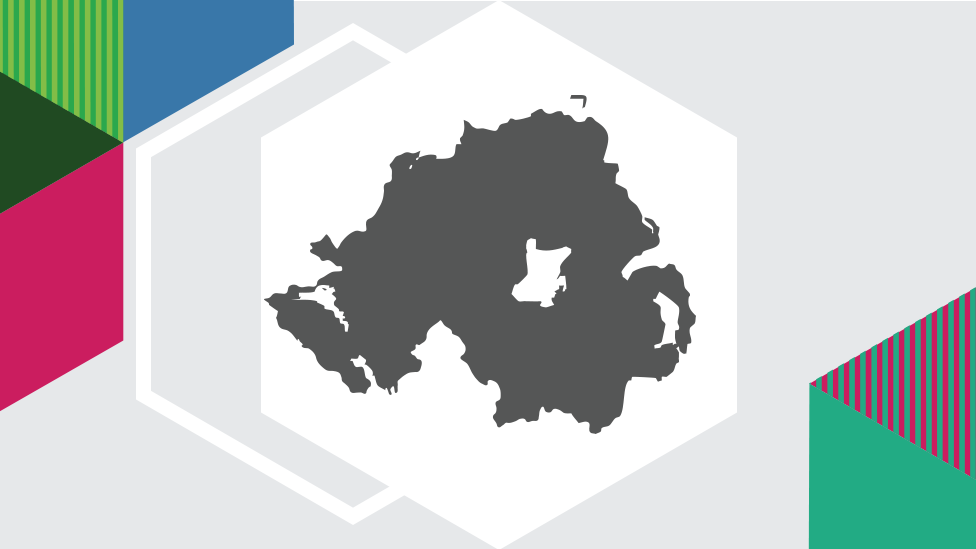NI election 2022: Will Sinn Féin's remarkable achievement be a turning point?
- Published
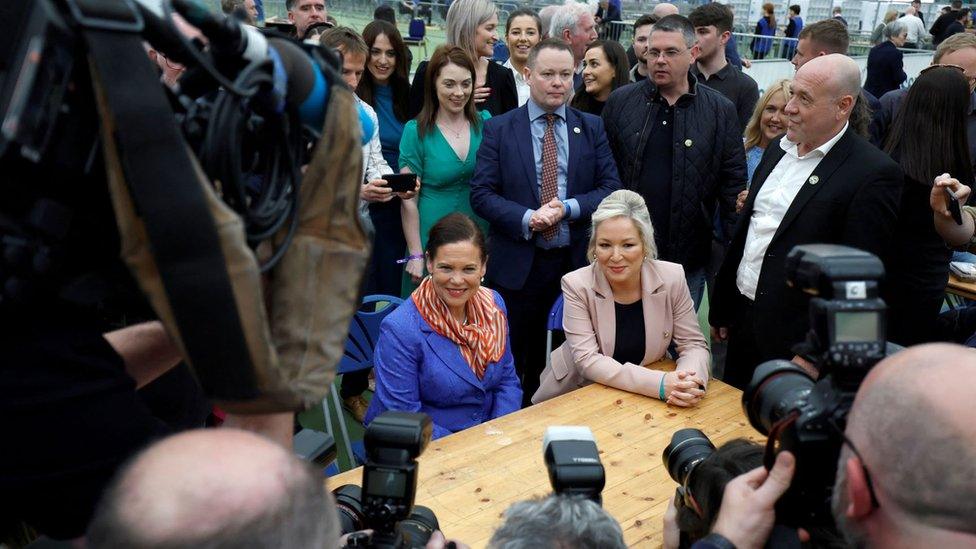
There has been much focus on the Sinn Féin leadership since the results of Thursday's election - Michelle O'Neill (right) could be Northern Ireland's new first minister
Sinn Féin's historic election result in Northern Ireland is a remarkable achievement for a party whose history is steeped in decades of conflict and the journey to peace.
Sinn Féin's goal is to achieve a united Ireland. In a sign of the party's opposition to its existence as a part of the UK, Sinn Féin refuses to use the term Northern Ireland, referring to it instead as "the North".
But power-sharing rules mean Sinn Féin must govern together with the Democratic Unionist Party (DUP), which has a strong British identity and believes in remaining in the UK.
These two parties have very different world views.
Sinn Féin has been involved in Ireland's fight against British rule for more than 100 years. During the 30-year conflict known as the Troubles, Sinn Féin was the political voice of the paramilitary group the IRA, which carried out many bombings and shootings.
The party was once ostracised because of its associations with a campaign of violence. But once the party decided on a way forward through politics - and had members elected as MPs in the 1980s - it began to gain popularity.
Peader Whelan is a former paramilitary prisoner who now works as a guide taking tourists around Belfast's old trouble spots. At the end of his tour, he hands them over to hear from a former loyalist prisoner on the other side of a peace wall - a large concrete and high wire fence dividing mostly Catholic and mostly Protestant communities.
He says the decisive win for Sinn Féin is a significant step for the political movement he has been part of for much of his life.
"There's no denying the significance," he says, "but I'm very conscious that although it marks a milestone, that there will still be a distance to go."
For those who remember the Troubles, Sinn Féin still deeply divides opinion. The party believes the conflict was a legitimate armed struggle, though it now strongly advocates peace.
"Sinn Féin now is unrecognisable compared to 30 years ago," says Brian Feeney, a nationalist historian and commentator.
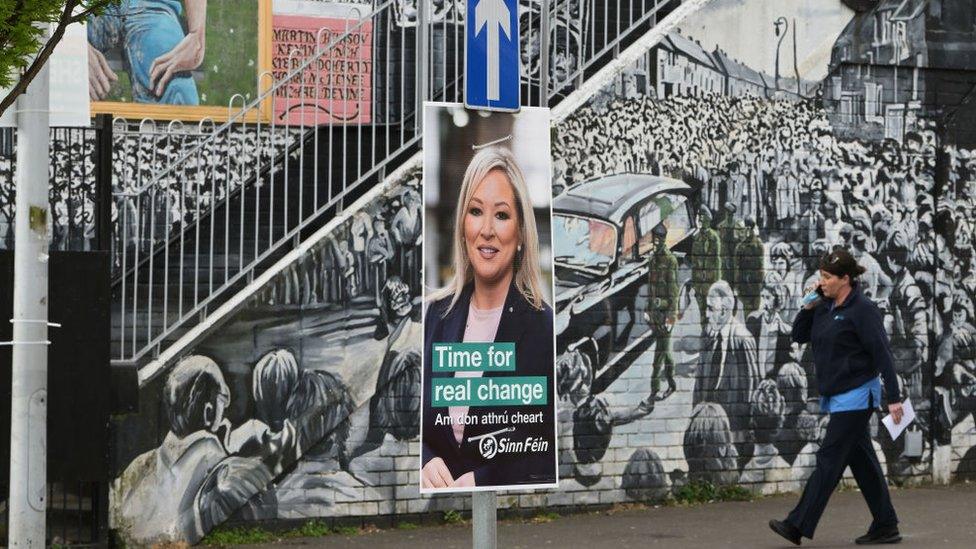
Murals - telling stories of the 20th Century history from the viewpoint of both nationalists, like this one, and loyalists - can still be seen around Belfast
Many of its supporters are too young to remember the conflict, which ended with the Good Friday agreement in 1998.
"None of them has ever heard an IRA bomb - this is something their parents talk about," he says.
And Sinn Féin has consciously cultivated a new image, he says. "Many of the old war horses are now gone. There's almost no elected representatives now who had a direct involvement in the conflict."
The challenge for the party now is to form a power-sharing executive at the Stormont assembly. The power-sharing system was created to ensure equality between unionist and nationalist communities, and it has often led to long periods of dysfunctional government.
Sinn Féin vice-president Michelle O'Neill is now entitled to the first minister role, but she cannot take up the position unless the DUP nominates a deputy. Despite their names, the roles are equal and one cannot hold office without the other.
But the DUP is unwilling to go back into the executive until its demands over changes to the Brexit arrangements are met.
It objects to the protocol, the part of the agreement that created a new trade border in the Irish Sea. The arrangement means there are now checks on goods travelling from Britain to Northern Ireland.
This was done to avoid a hard border on the island with the Irish Republic but some unionists believe it undermines Northern Ireland's place in the UK.
The DUP has made sure it has been out on the airwaves, though, repeatedly stressing it does want to go back into government if the protocol issues are resolved.
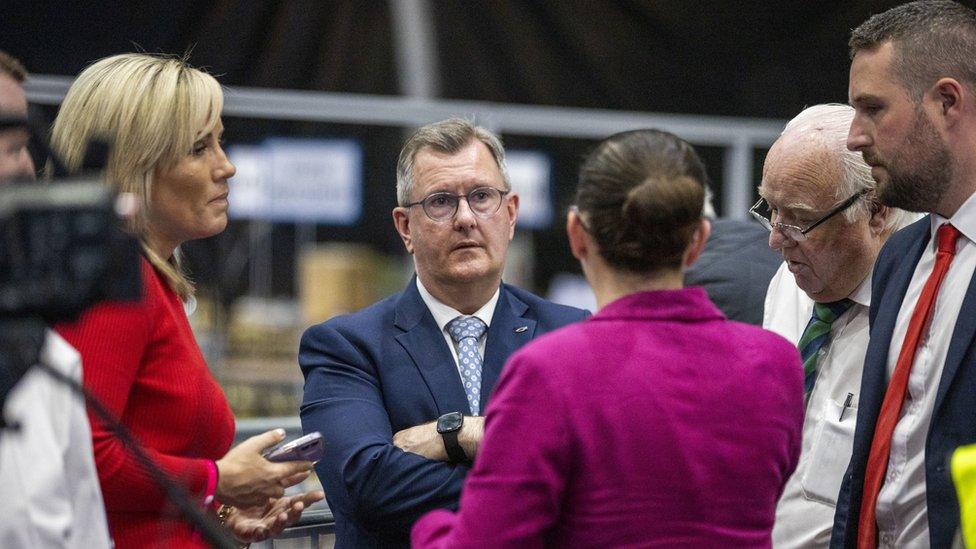
Will the DUP be willing to be seen as playing second fiddle to Sinn Féin?
Gavin Robinson, a DUP MP, said the party does want to see a functioning government but "sorting out the infectious nature of the protocol and the damage that it's doing" was its first priority.
That said, there is more than a sneaking suspicion among many analysts that there will be even less appetite within the DUP to take the deputy first minister role, because of the symbolism of seemingly playing second-fiddle to the party's bitter rivals.
The most likely scenario at the moment is that the parties will become deadlocked in months of negotiations.

HISTORIC MOMENT: From IRA politics to NI's biggest party
SINN FEIN: Who is Michelle O'Neill?
POSTCODE SEARCH: What are the results in my area?
THE ASSEMBLY: How power-sharing works in Northern Ireland

Emma Little-Pengelly, a former DUP special adviser and MP, says it would be wrong to interpret the election result as a surge in popularity for a united Ireland.
"What we've seen is a fracturing of unionism - there hasn't been a dramatic change in the size of the vote," she says.
She points out that Sinn Féin has picked up votes from other nationalist parties. Some young supporters say part of the party's appeal is that it appears to be putting out more positive messages.
Cliodhna Nic Bhranair, a young Sinn Féin supporter, believes Sinn Féin's focus on cost of living made its campaign more relatable.
"There's so much going on in the world right now, the cost of living is very high, the health service has been hammered over the last 10 years," she says. "I don't think it's any secret that Sinn Féin are for a united Ireland, but people need help with everyday things right now."
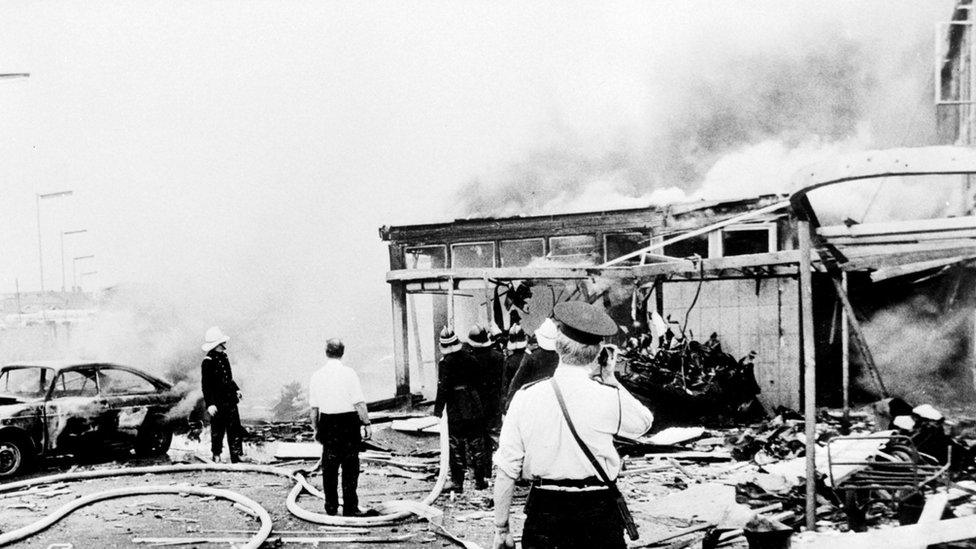
Some of those who voted in this week's elections are too young to remember the Troubles
Sinn Féin believes it would be easier to tackle these issues as a united Ireland, though it did not put a border poll front and centre of its campaign.
It will be a longer-term challenge for the party to widen support for a referendum on the issue by fleshing out what a united Ireland would look like.
It is also for the UK government to call a referendum if it appeared likely that most people wanted a united Ireland.
Most analysts don't expect there to be any likelihood of a border poll for some years, but nationalist commentators increasingly believe there will be one within a decade.
They point out that the proportion of people coming from a Catholic background - largely nationalist in their outlook - will probably be shown in the census results later this year as being larger than those from a Protestant background, who are more likely to be unionist.
Importantly, Sinn Féin is also now winning more votes than any other party in the Republic of Ireland too - and a border poll would need to be voted on in both parts of the island.
While nothing will change in Northern Ireland overnight, these elections have delivered a powerful picture for Irish nationalism.
And there is a sense that Sinn Féin's victory will come to be viewed as a major historical turning point.
- Published8 May 2022
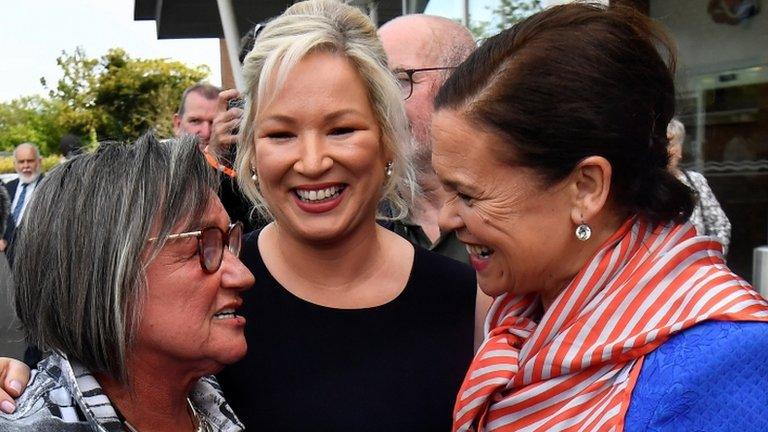
- Published7 May 2022
- Published8 May 2022
